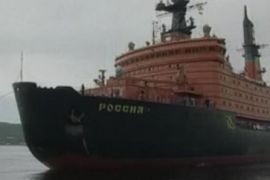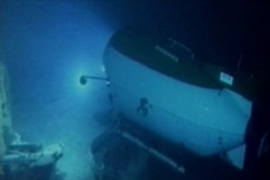Russia makes North Pole bid
Scientists say mineral resources lie beneath Arctic sea bed.

A Russian expedition plans to deploy two submersibles to the ocean floor beneath the North Pole to collect samples and data that could result in Russia extending its borders under international law all the way to the North Pole itself.
But this is no simple land grab: below the ice and beneath the Arctic sea bed, scientists believe there exists hydrocarbon and mineral riches that may one day be extractable.
Keep reading
list of 4 itemsWorld’s coral reefs face global bleaching crisis
Why is Germany maintaining economic ties with China?
Australia’s Great Barrier Reef suffers worst bleaching on record
The melting polar ice cap is another victim of global warming, but with the Arctic region becoming more accessible Russia races to stake its claim, Al Jazeera’s Jonah Hull reports.
|
|
| The expedition will use two submersibles to reach the North Pole sea bed |
Setting off from the port of Murmansk, a Russian expedition, on Sunday, aims to explore new depths of the Arctic sea bed, and prove Russia’s rights to untold deposits of minerals, oil and gas.
Artur Chilingarov, an expedition leader, said: “We have to prove that it belongs to Russia, that it is the northern border of Russia’s continental shelf. But we can’t do it just with words”.
Under international law, the five Arctic countries each control a 200 mile economic zone extending from the edge of their continental shelves.
This expedition intends to prove Russia’s shelf extends much further, allowing a claim to territory right up to the North Pole. It is an area the size of Germany, France and Italy put together.
Vladimir Chukov, a polar explorer, is convinced the area is rich in natural resources.
“In the future, he says, without doubt there is economic benefit. Why? Because these territories are a continuation of geological zones that today are rich in natural resources. So they must be too,” Chukov said.
| Video Link | ||
|
The expedition will use two submersibles to reach the sea bed 4000 metres below the North Pole.
It is risky and has never been done before. Sea-bed samples will then be used to establish a connection between the North Pole via an underwater ridge to the Russian mainland, he said.
One UK environmentalist said the irony is that rather than thinking how we are going to deal with these catastrophies or how to prevent or cope with them, people are thinking how they can extract more resources, namely fossil fuels.
Beyond concerns about global warming, this is an ambitious and controversial mission. And Russia is not alone.
Canada and Denmark also claim continental connection to the North Pole. Both are exploring ways to prove it. As more and more of the ice cap melts, the scramble for arctic territory is heating up.

